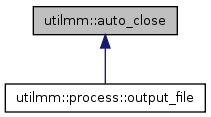utilmm::auto_close Class Reference
[OS-related tools]
#include <system.hh>
List of all members.
Detailed Description
The C++ guard mechanism applied to file descriptors: when destroyed, an auto_close object releases the file descriptor it has been given at construction.
Definition at line 39 of file system.hh.
Constructor & Destructor Documentation
| auto_close::auto_close |
( |
|
) |
|
| auto_close::auto_close |
( |
int |
fileno |
) |
[explicit] |
| auto_close::auto_close |
( |
FILE * |
stream |
) |
[explicit] |
| auto_close::~auto_close |
( |
|
) |
|
Member Function Documentation
| void auto_close::close |
( |
|
) |
|
Close the file descriptor right away
Definition at line 48 of file system.cc.
| void auto_close::detach |
( |
|
) |
|
Disassociates this object and the file descriptor associated with it without closing the file descriptor
Definition at line 62 of file system.cc.
| int utilmm::auto_close::handle< int > |
( |
|
) |
const [inline] |
Access to the file descriptor.
- Exceptions:
-
| std::bad_cast | Raised if the required type is not the right file descriptor type (i.e. if handle<FILE> is calledd on a auto_close object created with an 'int' fd) |
| void auto_close::reset |
( |
FILE * |
stream |
) |
|
First, close the current defined file descriptor and then sets it to a new one. Calling reset(-1) is equivalent to calling close() directly.
Definition at line 84 of file system.cc.
| void auto_close::reset |
( |
int |
fd |
) |
|
First, close the current defined file descriptor and then sets it to a new one. Calling reset(-1) is equivalent to calling close() directly.
Definition at line 79 of file system.cc.
Member Data Documentation
The documentation for this class was generated from the following files:
